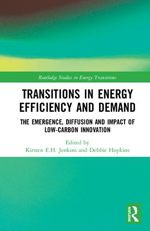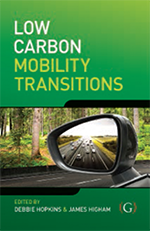Dr Debbie Hopkins
Associate Professor in Human Geography
Associate Professor in Human Geography
Academic Profile
Debbie is an Associate Professor in Human Geography jointly appointed between the School of Geography and the Environment, and the Sustainable Urban Development programme in the Department for Continuing Education. She is also an Official Fellow of Kellogg College, and an International Research Affiliate of the Centre for Sustainability at the Te Whare Wānanga o Ōtākou / University of Otago.
Debbie completed her master's degree (Geography, with distinction) at King's College London, PhD at Te Whare Wānanga o Ōtākou / University of Otago (Aotearoa New Zealand), and Postgraduate Certificate in Teaching and Learning in Higher Education (with distinction) at the University of Oxford.
Following postdoctoral training at the Centre for Sustainability (Otago; 2014-2016), and the Transport Studies Unit, University of Oxford (2016-2017), Debbie was appointed as a Departmental Research Lecturer between the Transport Studies Unit and the School of Geography and the Environment (Oxford, 2017-2019).
Debbie is an editorial board member of the Journal of Transport Geography, Applied Mobilities, Tourism Geographies, Journal of Sustainable Tourism and Global Networks. From 2021-2024, Debbie was the Editor-in-Chief of the American Association of Geographers Review of Books journal. Between 2017 and 2019, she undertook a part-time academic secondment with the New Zealand Ministry of Transport where she led a project on incorporating different forms of information and 'evidence' into policymaking processes.
Debbie currently leads a UKRI ESRC project (2022-2026), 'Trucking Lives: Making Space for People in Truck Driving Work', funded through the Transforming Working Lives programme. Working with colleagues from the universities of Sheffield, Newcastle and Durham, Trucking Lives unites insights from mobilities studies, labour geography and critical logistics to understand and make visible truck driver's everyday lives, identify changes needed to recruit and retain a diverse workforce, and find ways to improve workers' lives for the better. This builds upon previous research funded by the Oxford Fell Fund and the Chartered Institute of Logistics and Transport Seed Corn Fund.
Debbie has been part of several large research centres, including the Energy Cultures project (2013-2016, Otago), the Centre for Innovation and Energy Demand (2016-2018, Sussex, Manchester and Oxford), and the Centre for Research on Energy Demand Solutions (2019-2020, multi-institutional). Debbie has co-edited two books: Low Carbon Mobility Transitions (GoodFellow Publishers, 2016) and Transitions in Energy Efficiency and Demand (Routledge [Open Access], 2018).
Current Research
Debbie is a human geographer and environmental social scientist. Her research is concerned with just and climate compatible transformations, with a particular focus on mobility configurations in logistics and aviation. She engages with ideas from labour geography, mobilities studies, critical logistics and critical sustainabilities to further this agenda. Debbie is currently working on a number of projects that span these interests (primary projects listed below), many of which include international and interdisciplinary collaborators. Her research has been funded by national research agencies in the UK, Aotearoa New Zealand, Norway and elsewhere. Her research spans three main themes: 1. Logistical mobilities, 2. Aviation and the climate crisis, and 3. Academic mobilities.
Logistical mobilities
This research combines critical logistics studies with mobilities studies to recognise and interrogate the diverse mobility practices that take place within supply chains. More importantly, it reflects upon the power these hold, the injustices embedded within them, and their intransigence.
Logistical configurations incorporate a diverse array of mobility practices. The focus is often on enabling ‘smooth’ functioning supply chains, through the coordination of movements of goods, negotiating ‘frictions’ along the way.
Debbie’s research has shown how:
- ideologies of ‘just-in-time’ logistics are lived by workers - often clashing with bodily and family needs.
- the ‘unsafe trucker’ is used to justify investment in automation technologies; and
- shifting logistical configurations re/produce distinct discourses of technology change and its implications in road freight.
Aviation and the climate crisis
Debbie works closely with an international research team concerned with the rapid and sustained rise in air travel, and its disastrous effects on the climate. Their work has shown the ways the sector claims ‘climate compatible growth’ which science has repeatedly shown to be impossible without radical technological advancements. Motivated by the injustices associated with aviation, and this scholarship raises questions about what a climate compatible aviation would or could look like.
Her collaborative research has shown:
- that half of leisure flights lack explicit importance;
- how discourses and enactments of ‘sustainable aviation’ are locked into gendered environmentalism;
- how carbon-intensive transport modes - like aviation - are socially normalised through social media posts and ‘influencer’ culture; and
- how the nation state performs a variety of roles that benefit from and support aviation, creating conflicts with the state’s climate targets.
Academic mobilities
Since 2013, Debbie has been working on an agenda of academic mobilities in the climate crisis, showing how the globalised academic system locks aeromobilities into academic practice, but also recognising the injustices embedded within some actions to reduce academic mobilities and the privileges attached to im/mobilities. Debbie works with colleagues around the world to better understand the mechanisms that incentivise travel in academia and the transformative potential of technologies, polices and behaviour change.
Debbie’s collaborative work on academic mobilities has shown:
- how mobilities are locked in through university recruitment and promotion policy;
- that there are diverse clusters of mobility practices and preferences amongst scholars;
- that scholars experience academic mobilities differently, and these differences are unequal in the advantages they afford, with distinct gendered dimensions; and
- that the design of conferences has vast consequences for transport-related carbon emissions, and intercontinental travel account for 75% of emissions.
Teaching and Supervision
At Oxford, Debbie teaches across the undergraduate and graduate programmes. In the School of Geography and the Environment, she leads Prelims sustainability on the Human Geography course and an FHS Option for second and third year students.
In the Department for Continuing Education, Debbie teaches on the MSc Sustainable Urban Development, she leads the 'Climate Change' teaching week, and contributes lectures across the other 7 modules, on themes including critical sustainability, urban imaginaries and governing transition.
Debbie teaches at the Oxford School of Climate Change, hosted by the Oxford Climate Society, University College London, and the University of Otago (NZ), as well as speaking to other groups within and beyond Oxford.
Debbie supervises master's dissertations and DPhil students in Geography and Sustainable Urban Development.
Current Graduate Research Students
| Maryam Altaf | Gendered Mobilities and Platform-based Transport Services in Lahore, Pakistan |
| Faizal Bin Abdul Aziz | Exploring the Affective and Emotional Experiences of Singapore-based Flight Attendants amidst a Global Pandemic |
| Yi Fan Liu | Disaggregating the BlueSG assemblage: Examining the relational entanglements and emerging agencies of an electric car-sharing network in Singapore |
| Andreas Papallas (Dept of Continuing Education) | Cities of Diversity: Urban Development Perspectives on Displacement and Migration in Cyprus. |
| Julia Youngs (Dept of Continuing Education) | Beyond borders: the intersection of immigration, urban climate governance, and the border abolition movement in sanctuary cities. |
Outreach
Debbie actively seeks out opportunities for engagement beyond academia. To this end, she has written articles for regional and national newspapers, and contributed to the development of urban and national government policy (e.g. the advisory/ technical group, Te Ao Turoa - Dunedin's draft Environment Strategy, Dunedin City Council). Debbie was a founding committee member of the New Zealand Royal Society Early Career Researcher Forum, and the Otago Climate Change Network. She was formerly a committee member of the RGS-IBG Transport Geography Research Group. Debbie sits on the advisory board for the Oxford School on Climate Change.
Through the Trucking Lives project, Debbie works closely with the UK’s road haulage sector, collaborating with Eddie Stobart – a major UK haulier, the Road Haulage Association and other sectoral actor groups.
Selected Publications







